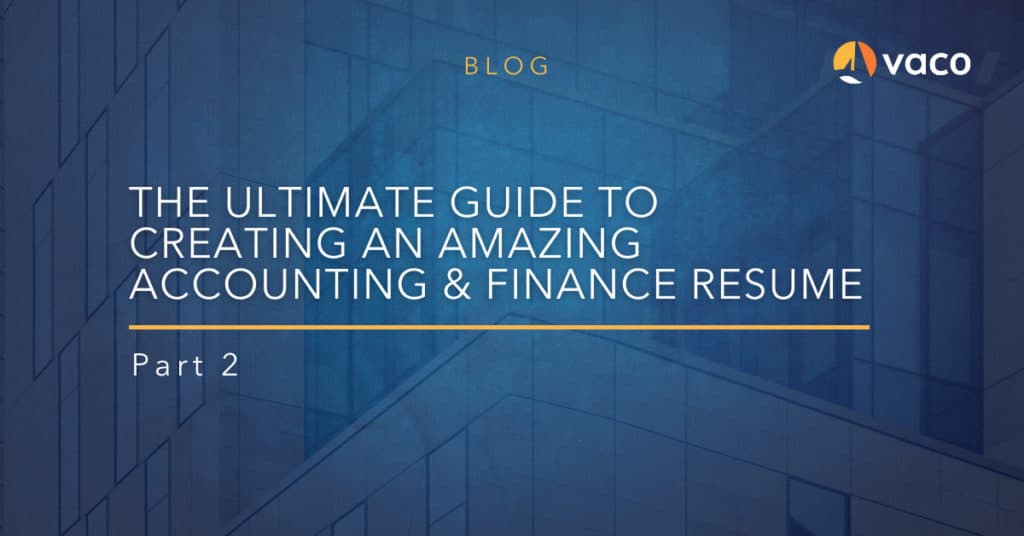Welcome back to the second part of our blog series on creating an amazing accounting & finance resume. We covered all the basics in our first installment — from making your first impression count to building a compelling employment narrative to the importance of proofreading — and this week we’re going to debunk a few enduring resume myths.
Be sure to check out our third and final installment where we’ll share some top resume tips and let you in on a few little-known best practices! And whatever you do, don’t forget to download your free accounting & finance resume template in the post below.
Quashing 5 popular resume myths
Myth #1: Your resume needs to fit on one page
Not necessarily. For recent graduates, junior accountants, clerks, and staff accountants with less than three to five years of experience, a one-page resume may be enough. However, for anyone with over six years of experience, this is definitely not the case.
It’s crucial to show growth within a company. Growth indicates a great level of accomplishment, drive, and unique knowledge. If one has been with a company for over six years and doesn’t have promotions listed on their resume it may give the impression that you’re not interested in growth opportunities or rarely go above and beyond (download the resume template at the end of the blog for tips on listing promotions).
The responsibilities of senior and executive-level accounting & finance professionals require more experience. To fully relate your employment trajectory, it’s important that each experience displays enough detail to demonstrate that you have the qualifications and the ability to fulfill the requirements of the role you’re applying for.
For many job-seekers, a one-page resume won’t cut it.
Myth #2: Education always needs to be at the top of your resume
For new graduates who don’t have a lot of work experience, their education is their most relevant experience. Recent grads should list their education at the top of the page, date of graduation, and any relevant honors, memberships, or certifications.
However, candidates who have ample work experience should list their experience first and end with their education.
Myth #3: Recent grads shouldn’t add every internship experience
If you’ve been on the job market for a while, having lots of short-term job experiences on your resume can be confusing for hiring managers. (Sound familiar? Be sure to come back next week to learn more about including a reason for leaving on your resume.)
However, if you’re a recent grad without a lot of full-time accounting & finance experience, you should add your internships just as you would list any other job. Don’t forget to include your dates of employment, roles, and responsibilities.
Speaking of internships, it’s highly recommended in the accounting & finance industry that students complete an internship in the field. Adding internships to your resume gives you a chance to show real experience related to a job. Graduates with internship experience have a big edge over all those graduates who don’t!
And prevent short-term thinking from getting in the way of your long-term goals. Even though you may be taking a pay cut from working at a restaurant to interning as an accountant, your patience and dedication will be rewarded with a much higher post-graduation salary. Over 50% of entry-level hires at the Big Four auditing firms were previously interns. And KPMG recruits an astounding 91% of its new employees from its intern pool. The figures say it all – internships put you at an advantage.
Having an internship — or several internships — will give you a massive advantage.
Interested in learning more about the importance of internships? Check out Accounting Internships 101 on Big4AccoutingFirms.org.
Myth #4: One-size-fits-all resumes streamline the application process
Let’s be clear: a one-size-fits-all resume just won’t cut it.
Many candidates assume that one resume to fit all positions is sufficient and will make applying for jobs easier. This could not be further from the truth. Many companies need to make sure that individuals they are considering for their role have the experience needed to fit their specific opening. And unless your resume speaks to them, it’ll wind up in the discard pile.
How do you make your resume speak to a hiring manager? By customizing your resume to the role you’re applying for. Or, at the very least, creating multiple resumes that cover different job titles. For example, you’ll want one resume for senior accountant applications, and another resume for financial analyst applications. Hiring managers want to see responsibilities that correlate with the open job opportunity.
Myth #5: You shouldn’t list every system and software you’ve ever worked with
Go ahead and show off your software savvy by adding all of your software and ERP systems experience. It’s better to be safe than sorry!
We hear from many of our executive candidates that they didn’t think it was necessary to list all software and systems. However, because hiring managers and companies look for this information, we highly recommend that our candidates include thorough lists of the software and systems they’ve used over the years.
In the accounting & finance world, Excel is extremely important. We encourage our candidates to list the specific functions within Excel that they’re comfortable using — like VLOOKUPS, HLOOKUP, Pivot tables, SUMIFS, Indexing — so a company can better understand their level of mastery.
And yes, adding versions of software is important! Refer to the resume templates below for more examples. Don’t forget to check in next week for the final installment of “The Ultimate Guide To Creating a Great Accounting & Finance Resume!”
Download our accounting & finance resume template in PDF format or Word Doc format to get started now!


